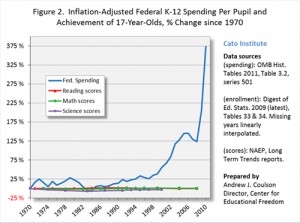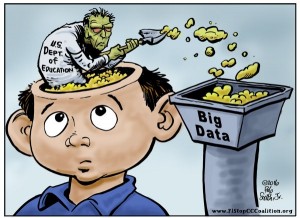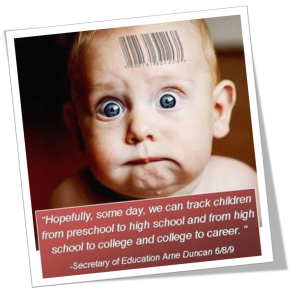Message to Congress: Our Children Do Not Exist to Provide Data to Researchers & the Feds!
The US House Education and Workforce Committee recently held a hearing titled “Strengthening Education Research and Privacy Protections to Better Serve Students.” Although there were some great positives such as hearing from a parent from the organization that took down inBloom, The Parent Coalition for Student Privacy, there was an alarmingly pervasive attitude that student data belonged to the government and researchers and that parent concerns about privacy are over blown. What follows is the introduction, a summary of the pros and cons from the hearing, our conclusions and recommendations from our extensively referenced document written by our president, Dr. Karen Effrem – Response to US House Privacy and Research Hearing. A summary of this document is available HERE.
INTRODUCTION:
We are grateful that the committee convened the very important recent hearing, “Strengthening Education Research and Privacy Protections to Better Serve Students, and for the opportunity to comment on it. With the Family Education Rights and Privacy Act being 40 years old; the Strengthening Research Through Education Act (SETRA) continuing dossier building via state longitudinal databases; and the expanded efforts to psychologically manipulate and profile our children via social emotional and mindset assessments in standards, curriculum and tests; it is extremely important that these bills be updated. Government data gathering on our innocent children must be very significantly pared back in content and kept to the local level and privacy protections strengthened. It is not just the data security that is an issue, but the type and amount of data that is gathered.
POSITIVES:
It is wonderful that Rachel Stickland from The Parent Coalition for Student Privacy, an organization that receives no government or special interest funding, founded and composed of parents, which brought down the Bill Gates multi-million dollar inBloom operation, was able to testify. Ms. Stickland did an excellent job given that she was defending herself and parents from three other Big Data witnesses. (See NEGATIVES below).
Some of the questions by members seemed to indicate a good understanding about the dangers of the extensive student data collection taking place and took parental concerns on that topic seriously, particularly Mrs. Foxx, Mr. Thompson, Mr. Brat, and Ms. Bonamici.
Ms. Stickland’s description of the State Longitudinal Data System (SLDS) was excellent and correct, especially the part about the result of this longitudinal data collection resulting in dossiers from birth. This includes genetic data at least in Rhode Island. I would just add that although the funding push for SLDS occurred during the stimulus bill, in a separate provision, in the Race to the Top grants, and in the America COMPETES Act, they were codified in ESRA in 2002 and continue in SETRA, which is why the data transparency language she mentioned is so critical for both SETRA and FERPA. If, as Dr. Hannaway mentioned, it is really true that the data is completely anonymized, this should not be a problem.
This question by Mr. Heck and Ms. Sticklands’s response as reported by Politico:
“He asked whether Common Core has ‘required new depths of data mining’ of students. ‘I’ve heard the same concerns from parents across the country,’ said Rachael Stickland, Parent Coalition for Student Privacy co-founder and co-chairwoman. ‘There’s a lot of new measurements of student achievement that doesn’t necessarily have academic purposes – grit and tenacity and those sorts of things, the sort of emotional factors. There are a lot of parents who are very, very concerned about this.’”
This is not just a concern, but absolute fact, and we applaud her for saying so. There is much evidence that non -academic social emotional teaching is being promoted through Common Core standards which means that there is psychological data gathering happening in the federally mandated mostly Common Core state tests.
NEGATIVES AND MISSED OPPORTUNITIES:
CONCLUSIONS:
We believe that student privacy and parental consent should always be considered pre-eminent compared to the research desires of the government or private sector, especially in the realm of psychological profiling.
The government has no constitutional, statutory, or moral right to collect data on highly personal and sensitive socioemotional data on our children.
According to data presented to this committee by the Cato Institute several years ago, federal involvement in education has yielded either stagnant or declining academic performance:
The vast majority of federal education programs are unconstitutional because the entire US Department of Education is unconstitutional, meaning that most of these programs should be eliminated with any remaining that can be shown to be effective and constitutional programs being block granted to the states.
Many studies showing the ineffectiveness and or harm of current government education and child social programs and the effectiveness of two parent family structure and other non-government academic and social measures are ignored raising the question of why we need so much research in the first place.
RECOMMENDATIONS:
Remove the social emotional research language from Section 132 of SETRA.
Prohibit social emotional data gathering and the use of data for predictive testing in the FERPA reauthorization.
Put in strict data transparency language and update the data security language per the recommendations of technical experts like Dr. Joel Reidenberg or Barmak Nassirian in any FERPA reauthorization.
Require third party software and testing vendors to notify parents of what data is collected on students and how it is used.
Find a way for students whose identity and privacy is compromised to be compensated, not just researchers or private vendors to be penalized.
Close the curriculum and assessment loophole for invasive surveys in PPRA.
Immediately demand that the US Department of Education repair the federal data security failures found in the Inspector General’s recent report and uncovered by the House Oversight Committee.
Strongly consider a moratorium on further federal research until programs already shown to ineffective and harmful are transformed or eliminated and until actually effective measures are actually implemented.
Constitutional, Statutory, & Privacy Concerns with Assessing Mindsets in the NAEP
The National Assessment Governing Board (NAGB) is planning to assess non-academic social and emotional “mindsets” like “grit” as well as school climate in next year’s National Assessment of Educational Progress (NAEP). Here is a summary of the many problems with this approach with details available at Mindsets in NAEP – final:
It is unconstitutional – There is NO constitutional, statutory or moral authority for the federal government to conduct psychological research on innocent American school children via what is supposed to be an academic test.
It violates federal statute prohibiting such activity in one or both of two ways.
It goes against several Supreme Court precedents affirming parent’s inherent rights to direct the education and upbringing of their children.
These types of questions are highly subjective as admitted by leading experts and organizations in the fields of education and mental health.
Because of the weak and gutted federal privacy law, the Family Educational Rights and Privacy Act (FERPA), this very sensitive data can be shared with various agencies of the federal government and third parties and re-disclosed and used for “predictive tests,” which are notoriously subjective and incorrect.
This subjective, allegedly predictive data may then well be used to make life altering decisions for children affecting college entrance, employment, etc.
According to information uncovered at recent US House Oversight and Government Reform Committee hearings, the state of data security at the US Department of Education is appallingly bad, so this sensitive data that the government should not have in the first place is not safe from hackers.
It seems that members of Congress and parents’ rights legal firms are starting to get interested in this situation. Please contact your US Senators and members of the US House of Representatives and ask them to oppose this illegal and unconstitutional plan via the power of the purse, especially if they are on the following committees:
US House Oversight and Government Reform Committee
US House Education and Workforce Committee
US Senate Health, Education Labor and Pensions Committee
Thank you and stay tuned!
Robert Holland Describes Federal Psych Profiling in Town Hall Column
Robert Holland interviewed Dr. Karen Effrem about the growing dangers of federal psychological profiling in multiple federal education programs in an excellent article entitled Do Parents Want Their Children on Uncle Shrink’s Couch?. He discussed how the US Department of Education is psychologically profiling our children in preschool programs like Race to the Top, Head Start, and now ESSA; via the reauthorization of the federal education research bill, SETRA (Strengthening Education Through Research Act – S 227), and planning to test subjective, non-academic, psychosocial “mindsets” via the National Assessment of Educational Progress (NAEP). The government’s term for all of this is social emotional learning (SEL). We have frequently discussed this topic in relation to child mental screening, Common Core, and preschool. Here are some excerpts:
One of the most influential ways the federal government is molding young minds is through “social and emotional learning” (SEL) programs, a prominent feature of the omnibus Every Student Succeeds Act (ESSA), which was signed into law by President Barack Obama in December 2015.
SEL has no clear definition in federal law, but many education sites tout SEL as instilling in students the necessary attitudes and skills that will supposedly enable them to manage their emotions, which in turn theoretically helps them do good things, such as showing empathy for others.
Very much in the same vein is the Strengthening Research Through Education Act (SETRA), which is currently being considered by Congress and will likely be passed soon. SETRA is a reauthorization of a George W. Bush-era law that extended the U.S. Education Department’s research arm into the collection of personal data about students and also authorized the use of linked state longitudinal databases.
Proceeding so far with minimal debate in Washington, DC, SETRA would expand federal education research to pupils’ “social and emotional learning, and the acquisition of competencies and skills, including the ability to think critically, solve complex problems, evaluate evidence, and communicate effectively.”
This kind of subjective probing of children’s attitudes, beliefs, and behavior amounts to psychological profiling that (thanks to electronic dossiers) could haunt an individual throughout a lifetime.
Dr. Karen Effrem, a pediatrician who has tracked this trend for years as the president of Education Liberty Watch, laments, “Parents are expected to submit their children to this kind of government profiling and psychological experimentation with no explanation, no way to express concern, [and no way to] opt their children out.”
Effrem also says SETRA is incredibly problematic because parents are afforded “no way to see the federally mandated assessments or to find out what private, sensitive psychological data was collected on their children as part of some online assessment and shared with some third-party vendor without their consent.”
Starting with the 2016–17 school year, the exploration of what education theorists call “the affective domain”—meaning feelings and emotions, as opposed to actual thought—will spread to the fairly well-respected National Assessment of Educational Progress (NAEP), also called the Nation’s Report Card. A background survey accompanying NAEP will attempt to assess a child’s grit and motivation, among other qualities.
Holland goes on to describe the preschool programs and the family engagement rule draft that are both very heavy on SEL and what the effects would be:
In plain language, this means the government will assess children every single step (or crawl) of the way, from cradle to career, to be certain they acquire all the attitudes, beliefs, and dispositions the omniscient, omnipotent government deems they must have. SEL, baby, SEL.
The plan to assess children and have this life long dossier determine their futures has been the plan for a very long time – at least as far back as Mark Tucker’s infamous 1992 “Dear Hillary” letter:
His vision is “…to remold the entire American system” into “a seamless web that literally extends from cradle to grave and is the same system for everyone” that is coordinated by “a system of labor market boards at the local, state and federal levels” where curriculum and “job matching” will be handled by counselors “accessing the integrated computer-based program.”
It has continued through the tenure of Arne Duncan’s tenure as Secretary of Education:
We must as parents stand together to protect the lives, privacy and futures of our children.
New Details on the Dangerous Social Emotional Research in SETRA
Karen R. Effrem, MD – President
Although there are several major problems with the reauthorization of the Education Sciences Reform Act (ESRA) now called The Strengthening Research Through Education Act (S 227, SETRA), the most pressing and concerning is the expansion of federal education research to psychologically profile our children beginning in preschool:
1) Lack of Constitutionality – The federal government has no constitutional authority (Tenth Amendment) to be involved in education, much less doing research and collecting data on the attitudes, beliefs, and behaviors of our innocent children. The Fourth Amendment to the US Constitution says:
Having the federal government sanction and fund psychological profiling of children is the worst kind of privacy invasion.
2) Subjectivity These parameters are admitted even by experts in the field to be extraordinarily subjective and difficult to define and measure. There is still no agreement about their meaning or even their selection over a period of ten years:
“Lack of longitudinal outcome studies”
“Broad parameters for determining socioemotional outcomes are not clearly defined” (National Center for Infant and Early Childhood Health Policy Addressing Social Emotional Development and Infant Mental Health in Early Childhood Systems 2005 (Emphasis added)
- The Committee learned at the November 17, 2015 hearing that the US Department of Education:
o Continues to be “vulnerable to security threats” according to the IG, and has repeat findings in annually-required FISMA audits;
o Failed to detect a penetration test of its systems conducted by the IG during its FY2015 FISMA audits [Federal Information Modernization Security Act];
o Received an “F” on the Committee’s FITARA scorecard [Federal Information Technology Acquisition Reform Act] .
- The Committee learned at the February 2, 2016 hearing:
o Despite the IG’s evidence to the contrary, Acting Secretary King asserted that Mr. Harris did not violate any law, regulation, policy, or standard of ethical conduct.
o Mr. Harris testified his home theatre installation and car detailing activities were “hobbies” and not businesses. The IG testified that these activities qualified as businesses.
o It was in excess of two years before ED responded to the IG’s initial report of findings and referral for administrative action.
o The Department of Justice (DOJ) declined to prosecute the IG’s criminal referral and deferred to ED leadership for action. Acting Sec. King deemed verbal counseling and a three-page ethics guidance letter as appropriate consequences.
5) Consent Issues – If curriculum and assessments are used to gather this data, will the consent requirements for this socioemotional research be circumvented by that loophole in Protection of Pupil Rights Amendment (PPRA)? PPRA, cited in section 82 as 20 USC 1232h, prohibits the collection of psychological, political, religious, and other sensitive data in surveys, however, the law says that these prohibitions do not apply to “curriculum and instructional materials” or to “tests and assessments,” such as those required to be aligned to Common Core in most states.
- “In national policy, there is increasing attention on 21st-century competencies (which encompass arange of noncognitive factors, including grit), and persistence is now part of the Common Core State Standards for Mathematics.” (US Office of Educational Technology -emphasis added.)
- “ASCA [American School Counselors Association] Mindsets & Behaviors align with specific standards from the Common Core State Standards through connections at the competency level. (Emphasis added)”
- “[A]s new assessment systems are developed to reflect the new standards in English language arts, mathematics, and science, significant attention will need to be given to the design of tasks and situations that call on students to apply a range of 21st century competencies that are relevant to each discipline. A sustained program of research and development will be required to create assessments that are capable of measuring cognitive, intrapersonal, and interpersonal skills.” (US Office of Educational Technology-emphasis added.)
- “There are important opportunities to leverage new and emerging advances in technology (e.g.,educational data mining, affective computing, online resources, tools for teachers) to develop unprecedented approaches for a wide range of students.” (US Office of Educational Technology -emphasis added.)
For these and many other reasons, please continue to contact your US House member at 202-224-3121 to let them know of the dangers of this bill. Please let them know that not objecting to an unrecorded voice vote or voting yes in a recorded vote will be considered allowing federally sanctioned psychological profiling and invasion of your children.
Issues
- Assessments + Testing (25)
- Bullying/Sex Education (6)
- Child Protection League (2)
- Common Core Standards (78)
- Curriculum + Standards (65)
- Data Collection and Data Privacy (64)
- Early Education/Nanny State (75)
- Federal Education (128)
- International Education (6)
- LGBT Issues in Education (9)
- Media Appearances (4)
- PL/CBE (2)
- Planned Economy (11)
- Politics of Education (26)
- School Violence (9)
- Social Emotional Learning/Mental Health (52)
- State Education (89)
- Testimony/Presentations (17)
- Uncategorized (13)
- Unions (10)
Education Liberty Watch Projects
ELW Allies
- American Principles Project
- Cato Institute
- Conservative Teachers of America
- Constitutional Coalition
- Eagle Forum
- Minnesota Advocates and Champions for Children
- Missouri Education Watchdog
- Restore Oklahoma Parent Empowerment
- Stop Common Core
- The Pioneer Institute
- Truth in American Education
- What is Common Core – Education Without Representation







